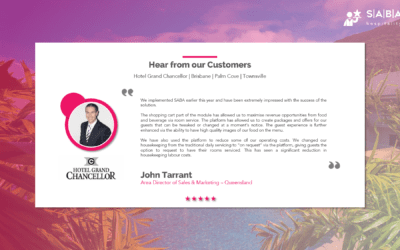With booking platforms like Airbnb, HomeAway, and Booking.com becoming more popular by the week, it’s little wonder growth of the vacation rental management industry has surged over the past few years. In some regions, the growth of available properties has been so rapid, it has led governments and local councils to consider the influence short-term rentals are having within designated residential zones. Some regulators have even implemented restrictions on the industry in an attempt to curve what they believe are negative impacts on neighborhood communities. Despite this, the number of people looking to earn additional income renting out their properties has continued to accelerate, leading vacation rental management to become an $87 billion industry (Airbnb alone claiming their property listings result in 2 million bookings each day).
However, many fail to recognize the time commitment and life impact a short-term rental can ultimately have. Once a property is listed, hosts don’t simply become property managers, they must also take on the role of cleaner, carpenter, tour guide, concierge, business owner and social media specialist. And if you want to succeed in an industry where online ratings can dictate success or failure, it all better be done with a smile on your face. And that’s before we even consider the endless emails and text messages that every host receives from an increasingly demanding guest demographic that expects instant attention to all of their needs. Which when you have a job, run a household, or simply want a little time to yourself, can become simply overwhelming.
There are many ways hosts try to alleviate the time and energy commitment. Creating guidebooks seems to be the latest trend. But has anyone noticed guests still contact you looking for information that is readily available in your property manual? This is a particularly interesting phenomena, especially given the time and effort many hosts expend to create what I would consider a fantastic resource for their guests. The problem is (and it’s unavoidable), the modern guest just doesn’t like to spend time reading or searching for information. It’s not how they live their everyday lives and it’s certainly not how they are going to behave when travelling. That’s why you still receive the same old questions from guests regardless of the fact your listing’s page or guidebook answers such questions clearly and concisely.
Unfortunately, no house manual (paper or digital), or web page, will ever counter people’s natural behavior and tendencies. When people see an easier path to what they are looking for, they will take it every time, and your guest is no exception. And more often than not in the world of communication, that path is messaging (or to a lesser extent an email). Because that’s how people communicate each and every day. In their working lives. In their personal lives. And it’s how they want to communicate with hosts. Ever heard of the 24 hour news cycle? This is the 24 hour guest communication cycle. And it never stops!
Hotels have guest service agents and concierges to manage a guest’s every need 24 hours a day. They answer questions, organize activities, plan itineraries and book tickets. It’s their job and they’re really good at it. The best (and in many cases, the only) person for this job in the vacation rental space is you. Let’s face it, nobody knows your city and neighborhood like you. It’s the host who can recommend those hidden gems and useful city information that will take a guest’s experience from enjoyable, to unforgettable. Worthy of that 5 star rating that is so critical for success. And it is critical. The difference between 4 and 5 star reviews is vast, especially considering the volume of available properties and the similarity of many. Nobody knows this better than market pioneers like Airbnb, who anoint “Superhost Status” on those who excel at providing their guests with exceptional experiences with one requirement being: “Maintain a 4.8 overall rating considering a property’s reviews of the last 365 days.”
So as a host, or property manager, what’s the best way to manage your guest communication? What’s the most effective method to provide guests the information they need, at the time they need it? To ensure they feel looked after, and that their stay is both seamless and memorable. Monitoring your phone day and night is not realistic. Responding to emails is time consuming, and quite frankly, will be unlikely to meet the expectations of many guests that you respond to them instantaneously. And guidebooks, no matter how well intentioned and put together, don’t present information in a manner that meets the needs and wants of the modern traveler. So what’s the answer?
Enter the Virtual Host!
I can almost hear you thinking, “what’s a virtual host”? Well, the answer is simple. Virtual hosts are a digital version of you. There to service your guests 24 hours a day, 7 days a week. And it’s all automated, so you don’t have to lift a finger. But rather than describing the technology, let’s consider this scenario, a common one in the short-term rental market.
Your guest arrives at the airport, but they’re not sure how to get to the property. Looking for their confirmation email is a hassle, so they message the host. Except it’s not the host, it’s the property’s virtual host. Which not only provides directions, but also tells the guest the type of transport that is recommended. And the answer is instant, without human intervention. The guest then arrives at the property, but the journey has been long and they can’t recall how to gain access. Again they message their virtual host, who instantly provides them with detailed instructions on how to enter the property. This is vital information being sent directly to the guests own mobile device, in the form of a message, at the precise time they need it. For the guests, it feels as though the human host is waiting by the phone, to answers all their questions, at the exact time they need.
The guest then enters the property. What’s the first thing they want? I know you know this one. It’s the same initial question all hotel guests ask the reception staff. The same information all restaurant patrons want. You guessed it, the WiFi password. This information is in the arrival email AND the property guidebook, but who will look there when all they need to do is send their virtual host a message and ask “How do I get WiFi”? And this applies to everything. From instructions on how to use appliances, to where household items are kept. Check-out times and instructions. Where the nearest grocery shop is. Even host recommendations on the best restaurants, bars and activities that will create that truly unique and memorable stay. Virtual hosts provide all this information, and because the answers are automated, a host’s most precious commodity, TIME, is not interrupted.
Now, I hope you can see automating guest communication is a huge plus for any host or property manager, but virtual hosts have a range of other benefits that traditional communication methods simply can’t provide. Firstly, they can communicate in any language, so all those misunderstandings between hosts and their international travelers can be a thing of the past. Good virtual hosts will also collect real-time feedback from guests, while they are still at a property, and instantly alert the property owner or manager their guest isn’t happy. What’s the benefit of this? You can take steps to rectify the situation prior to a guest departing or leaving a damaging online review. And for those owners who rented their property to make additional income, the more advanced virtual hosts will provide a mechanism for property owners and managers to make extra money by offering guests the additional services they already want and need. Things like luggage storage, late-checkout, cleaning services, or tickets to events, can increase the revenue any property makes with almost no time or effort.
Now I know what you’re probably thinking. This sounds time consuming and difficult to set up. But that’s the great thing about technology, it does the heavy lifting for you. In fact, the most advanced virtual host solutions have refined the process so it’s as easy to set up as creating a social media profile. And if you’ve ever created a guidebook (digital or hard copy) for your property, setting up your own virtual host will take about the same time. Actually scrap that, it will probably be much quicker as any good virtual host platform will allow you to copy and paste your guidebook answers, directly into your virtual host program.
So to finish, there’s no doubt offering a short-term rental property can be both financially and emotionally rewarding, allowing hosts to generate additional income while providing travelers the world over with experiences they will cherish for life. But it can also be challenging. High levels of competition mean hosts and property managers must continually innovate their offering to not only meet, but surpass their guest’s expectations. Communication forms a critical element of this. We live in a world of instant gratification. Where we not only want but expect instant resolutions to all of our problems. In the world of short-term rental accommodation, this means providing guests with everything they want and need, at the time they request it. Failure to do so, and you run the risk of annoying your guests and receiving negative online reviews. Virtual hosts can all but eliminate these risks, providing answers to all questions and requests automatically, 24 hours a day, so not only are guests provided with a seamless and memorable experience, but hosts and managers can preserve their precious time.




0 Comments